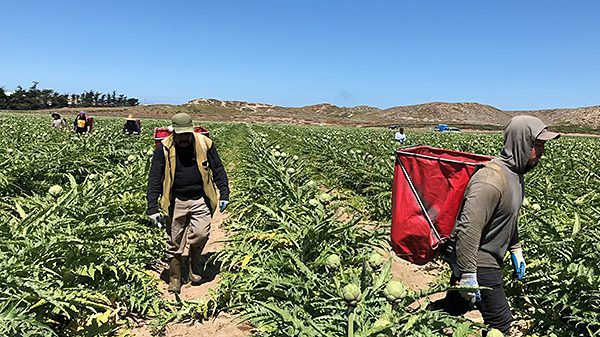I keep coming back to the subject of labor because it is the biggest issue in the produce industry. It will remain so long after the situation in the United States approaches something closer to normal.
How big an issue? Philip Martin, a farm labor expert at the University of California at Davis, writes, “Half of the $39 billion in U.S. farm labor expenses reported by farmers to the Census of Agriculture in 2017 was paid by farms producing fruits, vegetables and horticultural specialties, FVH commodities. Labor was 30 to 40 percent of FVH farms’ production expenses.”

It is curious. American business is all about doing the impossible—“Damn the obstacles, full speed ahead!” It would be hard to find a nonfiction title in any airport bookstore that was not selling this message. Yet a strange fatalism seems to hang over farm labor.
You could write a book about why. But one stark fact has to be faced: many in the industry cut corners by hiring illegal workers under the table, paying them substandard wages, and providing poor living conditions for them. A good business does not do this, but not all businesses are good businesses.
Recently, in a wonderful book by Thomas Wedell-Wedellsborg on problem solving called What’s Your Problem? I came across a possible solution. (For an article-length version of his ideas, click here).
Wedell-Wedellsborg describes an office cleaning business called Managed by Q (named after the all-provident quartermaster in the James Bond films). The founders “would eventually go on to attract more than $100 million in funding and serve offices all around the country.”
Most importantly, “they also gained acclaim for their innovative and humane labor practices. Breaking with the much-maligned contractor model employed by other start-ups, the founder decided to employ their cleaners full time, give them 5 percent of the company, and create real career paths for them. As a result, perhaps for first time in history, cleaning has become more than a dead-end job.” (Managed by Q has recently been acquired by Eden, a workplace platform company. The price, according to Wedell-Wedellsborg, was reputed to be over $200 million).
Could this model be replicated with farm labor? There is no obvious reason that it can’t. Would growers pay for a service that delivered the number of farm workers needed when they were needed, handled all the paperwork (including immigration), and did it all on a basis that was fair and humane to the workers? I suspect they would.
This is merely an idea. I don’t know how or if it could be implemented. Nevertheless, many more outlandish ideas have been turned into profitable businesses. Someone who took it seriously would have to do market research, work up feasibility studies, write a business plan, and go through all of the usual steps in launching a new enterprise. Many such enterprises—even the best-conceived ones—fail, so there is no guarantee of success.
I am very far from an expert in any of these areas, and this article is mostly an exercise in creative thinking. But all real solutions start with creative thinking.



